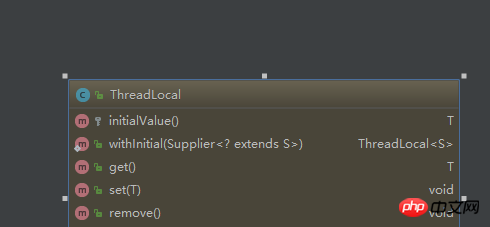
The content of this article is about the use of ThreadLocal in Java multi-threading. It has certain reference value. Friends in need can refer to it. I hope it will be helpful to you.
In a multi-threaded environment, thread synchronization must be performed when accessing non-thread-safe variables, such as using thesynchronizedmethod to access aHashMapinstance. However, synchronous access will reduce concurrency and affect system performance. At this time, you can trade space for time. If we allocate an independent variable to each thread, you can use non-thread-safe variables in an asynchronous manner. We call such variables thread-local variables.
As the name suggests, thread local variables mean that each thread has its own independent copy of the variable, which cannot be accessed by other threads like ordinary local variables.Javadoes not provide language-level thread local variables, but provides the function of thread local variables in the class library, which is the protagonist this timeThreadLocalclass.
Usage of ThreadLocal

ThreadLocalthreadLocal = new ThreadLocal () { @Override protected Integer initialValue() { return 0; } };
ThreadLocalthreadLocal = ThreadLocal.withInitial(() -> 0); System.out.println(threadLocal.get()); threadLocal.set(16); System.out.println(threadLocal.get()); threadLocal.remove(); System.out.println(threadLocal.get()); // 同一个线程的输出 0 16 0 Process finished with exit code 0
The principle of ThreadLocal
Then ThreadLocal is How to implement the function of thread local variables? In fact, the basic principle of ThreadLocal is not very complicated. ThreadLocal internally defines a static class ThreadLocalMap. The key of ThreadLocalMap is the ThreadLocal object. The value of ThreadLocalMap is the value stored by ThreadLocal. However, this ThreadLocalMap is maintained in the Thread class. Let’s take a look at some of the source code of ThreadLocal:// ThreadLocal的set方法 public void set(T value) { // 获取当前线程对象 Thread t = Thread.currentThread(); // 获取Map ThreadLocalMap map = getMap(t); if (map != null) // 设置值 map.set(this, value); else // 初始化Map createMap(t, value); } // ThreadLocal的createMap方法 void createMap(Thread t, T firstValue) { t.threadLocals = new ThreadLocalMap(this, firstValue); } // Thread类定义的实例域 /* ThreadLocal values pertaining to this thread. This map is maintained * by the ThreadLocal class. */ ThreadLocal.ThreadLocalMap threadLocals = null;
static class Entry extends WeakReference> { /** The value associated with this ThreadLocal. */ Object value; Entry(ThreadLocal> k, Object v) { super(k); value = v; } }
// ThreadLocalMap的set方法 private void set(ThreadLocal> key, Object value) { Entry[] tab = table; int len = tab.length; // 计算在Entry[]中的索引,每个ThreadLocal对象都有一个hash值threadLocalHashCode,每初始化一个ThreadLocal对象,hash值就增加一个固定的大小0x61c88647 int i = key.threadLocalHashCode & (len-1); for (Entry e = tab[i]; e != null; e = tab[i = nextIndex(i, len)]) { ThreadLocal> k = e.get(); // 如果键已存在就更新值 if (k == key) { e.value = value; return; } // 代替无效的键 if (k == null) { replaceStaleEntry(key, value, i); return; } } tab[i] = new Entry(key, value); int sz = ++size; if (!cleanSomeSlots(i, sz) && sz >= threshold) rehash(); } private static int nextIndex(int i, int len) { return ((i + 1 You can see that ThreadLocalMap treats the Entry[] array as a ring. Starting from the calculated index position, if the index already has data, it will be judged whether the Key is the same, and if it is the same, the value will be updated. Otherwise, just wait until you find an empty position and put the value in it. The same is true when obtaining values. Starting from the calculated index position, one by one is checked to see if the keys are the same. If there are many hash collisions, the performance may not be very good. The application of ThreadLocal
##The application of ThreadLocal is very wide, for example, Java engineers are very familiar with it ThreadLocal is used in the Spring framework to encapsulate non-thread-safe stateful objects, so we can declare most beans as singleton scope. When writing multi-threaded code, we can also think about whether it is better to access non-thread-safe stateful objects in a synchronous manner, or whether it is better to use ThreadLocal to encapsulate non-thread-safe stateful objects.
The above is the detailed content of The use of ThreadLocal in Java multi-threading. For more information, please follow other related articles on the PHP Chinese website!